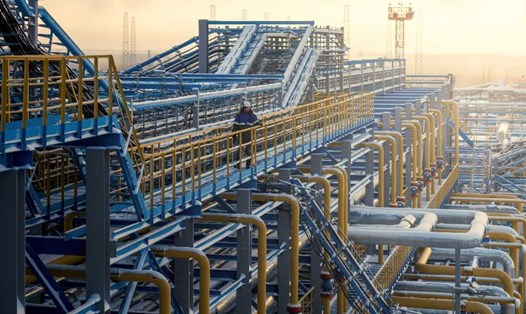According to some sources collected by Reuters, on April 21, the European Union (EU) is reviewing options to help US liquefied natural gas (LNG) exporters easily comply with regulations on methane emissions, in the context that the bloc wants to avoid the risk of a trade war with President Donald Trump.
One of the options being considered is the possibility of the EU adjusting the application of methane laws to create an advantage for US gas exports, with the aim of not weakening the overall legal framework.
To do this, the EU could introduce a number of technical rules to recognize LNG from the US, even if it does not fully comply with EU standards, and still achieves equivalent emission control. At that time, US LNG will automatically be eligible to be imported into the European market.
However, this plan could be hampered by Mr Trump's desire to lift the regulation requiring US gas producers to report methane emissions - which makes it difficult for the EU to automatically justify the recognition of equivalents.
Currently, the EU and the US are said to want to include energy in a major trade deal, in which the EU's increase in US LNG imports is considered a common benefit. The European Commission (EC) is also drafting a proposal for talks with Washington to avoid Mr Trump's additional tariffs.
European Commission President Ursula von der Leyen recently said that the EU could end its dependence on Russian gas before 2027 by increasing LNG imports from the US - a solution in line with Trump's repeated call for Europe to buy more US oil and gas to balance bilateral trade.
However, the EC spokesperson declined to comment on the possibility of adjusting the methane law in the direction of benefiting US LNG exporters, only saying that the Commission still maintains dialogue with the industry on issues related to the law.
The EU has also begun to require oil and gas importers to monitor and report methane emissions from shipments entering the European market, Reuters reported.
Although the EU's methane law is seen as being able to give US LNG an advantage over higher-emission gas sources such as from Russia or Algeria, US producers still warn that they will have difficulty complying.
The reason is determined to be that the US gas industry is too dispersed, making it impossible to track methane emissions along the supply chain, because a shipment of LNG is often mixed from many different gas mines.
Last month, the European Commission held an online meeting with US LNG companies to listen to their concerns regarding the new regulation.
The US is now the largest LNG supplier to the EU, after sharply increasing exports to help Europe replace Russian gas since Russia launched a special military campaign in Ukraine in 2022.
Last year alone, the US accounted for 45% of LNG imports into the EU, equivalent to about 16.5% of the total gas and LNG supply of the bloc.











